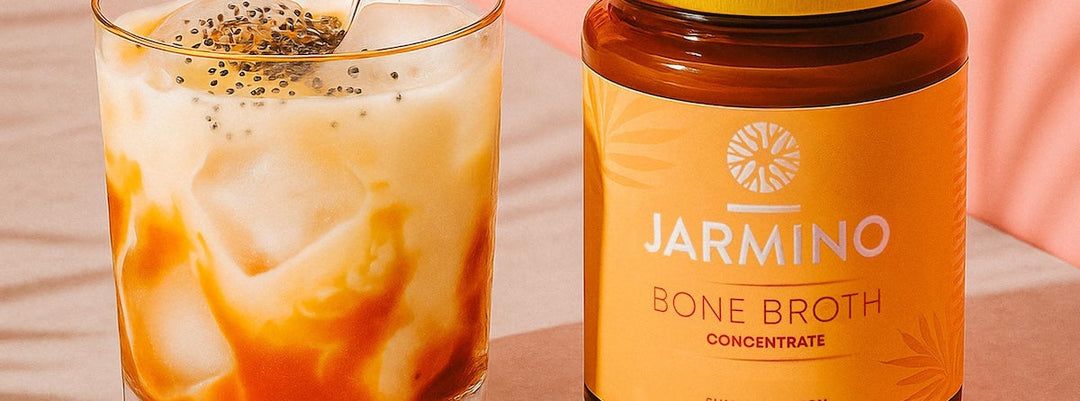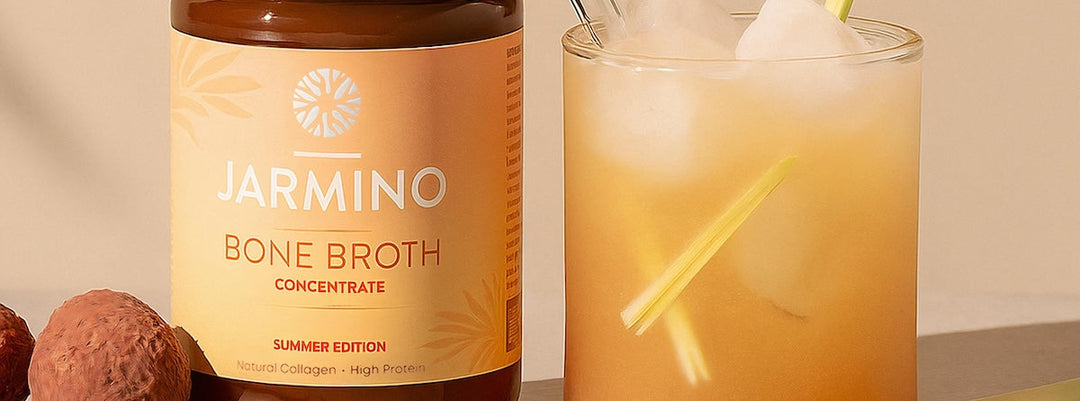A healthy gut promotes a stable immune system. Your mood, how well your skin is doing and even autoimmune diseases can be influenced by the gut.
Sounds serious, and it is!
A healthy gut is highly complex and needs to be looked after. Because between 300 and 500 species of intestinal bacteria live in your digestive tract, numbering in the millions. Most of them are good bacteria and are important for your health. However, they need to be nourished so that they can maintain your health.
However, if the bad gut bacteria outnumber the good, it can lead to loss of energy, illness and low mood. Such an imbalance in the gut can increase inflammation that takes years to become visible and noticeable.
You get sick without even realising it.
We'll explain what you can do and eat to keep your gut in a healthy balance in a moment.
Now we'll show you how your gut works.
How your gut works
To digest means to break down the food you have eaten into its components. By breaking down the food, your intestines release important nutrients and the rest is excreted as a waste product. How long this process takes depends on what you eat. Digestion can take anywhere from 20 hours to 65 hours.
As you can see, your intestines have a lot to do.

Station 1 - Mouth and oesophagus
For good reason, digestion begins in the mouth.
Why?
By chewing the food at rest, you not only break down the food for the intestines to break down, you also salivate it, which pre-digests the morsel in your mouth. You also prevent the food from lying like a lump in your stomach.
An unpleasant feeling.
Once you have done this, the chewed food slides down the oesophagus towards the stomach due to the contraction of the surrounding muscles.
Station 2 - Stomach
Stomach acid is found in the stomach. Stomach acid is one of the most aggressive and acidic substances in your body. And that is right and important.
This acidic substance can kill bacteria or general bad components in the food pulp. The stomach protects itself with a protective film that stomach acid cannot penetrate. Sometimes you feel your stomach working after eating. If this is the case, it flings back and forth and slides towards the duodenum due to the permanent tensing and relaxing of the intestinal muscles.
Station 3 - Duodenum
In the duodenum, the food pulp from the stomach is neutralised. This has to happen because only the stomach has the protective film that can protect against the excessive acid.
In addition, the mush is further broken down by the addition of enzymes so that it is ready for the small intestine.

Source: Deutsche Krebsgesellschaft (DKG)
Station 4 - Small intestine
In the small intestine, the food is broken down further. The small intestine does this in cooperation with the pancreas, which produces the necessary digestive juices.
In the small intestine, which is about 5 metres long, the nutrients from the food can pass into the blood because the mucous membrane is permeable to them.
It is a sensitive interaction, because the approx. 500 square metres of permeable mucous membrane is useful for nutrients to get into the bloodstream, but not for bad components from the food to find their way into your body. Unfortunately, this is exactly what happens with leaky gut syndrome: due to a one-sided, typically Western diet, the intestinal wall is attacked and toxins can enter the bloodstream, which can then cause inflammation in the body and trigger diseases.
One more reason to keep your intestines healthy.
Station 5 - Colon
The residual liquid and minerals are extracted from the food pulp by the large intestine and supplied to your body.
Almost 90% of minerals are processed here and made available to you. The large intestine only manages this incredible performance thanks to its healthy intestinal flora. This intestinal flora consists of millions of microorganisms that are important for the extraction of minerals and other trace elements.
If there are problems here, your large intestine cannot extract as many minerals from the food as it should be able to. Your digestion becomes sluggish and inefficient. The result can be deficiencies because the food cannot be broken down properly.
At the end of this digestive process, you are left with food residue. With the help of mucus, this is led out of the intestinal wall towards the rectum. The stool is stored there until it is finally excreted.
Promote a healthy gut
It's actually easy to promote your gut health: Cut out what's bad for you and eat what's good for you and your gut.
Easier said than done.
Since you've read about the effort it takes to digest your morning cereal, you'll want to know what you can and shouldn't do to maintain your health.
And that's exactly what we're focusing on now.
Relaxed digests better
It sounds like a cliché.
But turn off the TV and radio and maybe eat only to the sound of birds singing (from the garden or PC) and eat with your family. A calm and relaxed environment when eating promotes better digestion because you eliminate disruptive factors.
You've experienced how hard your gut works at digestion and yes, it is work. Your body is focused on it, so you would do well not to be distracted while eating by watching TV or getting excited about the 9:30 news on the radio.

Chew slowly - even slower(!)
Being fast may be great when sprinting, but when eating, be slow and chew thoroughly. The more time you take to chew, the better you digest. Your gut appreciates it when food arrives already chewed and doesn't have to process half a boulette.
Chewing your food thoroughly and eating your meals more slowly can promote complete digestion and absorption of nutrients. This helps reduce digestive discomfort and maintain a healthy gut.
Tip: Having chewed at least 30x per bite is a good value. Admittedly, it gets difficult with soups. It doesn't have to be 30 times.
Do not build a skyscraper on the fork
You don't have to load your fork to the max with food. Take smaller portions that you can move back and forth in your mouth. If you take too big a bite, you'll quickly look like a hamster preparing for winter.
Make sure you get enough fibre
Fibre is not a burden on your intestines. They are good for it. But only slowly increase their share in your diet. Your intestine is a miracle of nature, but it also only gets used to a change in diet slowly.
What's more? Dietary fibre keeps you full for a long time.
Make sure your diet has a good balance of fibre, protein and healthy fats. Often good fats like olive oil or linseed oil are important so that the fibre can be broken down.
High-fibre foods such as beans, peas, oats, bananas or berries have been shown in various studies to have a positive effect on gut health (2). They provide prebiotics that promote the good bacteria in the gut.
Add variety to your diet
It's easier for you to indulge in healthy eating when you don't feel flagellated. Instead of giving up milk, dairy products (not also FETA and Parmesan...), red wine, cereals and so on, eat a little of everything.
The change will not only be easier for you, but you will already be doing something good for yourself. Instead of eating bread twice a day, you eat bread 6 times a week, for example.
It is better to eat a little bit of everything and sometimes, instead of getting into a monotonous and one-sided diet through prohibitions. This one-sided diet cannot be healthy for you, even though you are supposedly eating only good ingredients. So try to have variety in your diet, as this has a positive influence on your metabolism.

Top: Healthy intestine, colonised with positive intestinal bacteria.
Bottom: Sick intestine, without intestinal bacteria
Intestinal bacteria - the best subtenants in the world
Good gut bacteria are important not only because they support healthy digestion, but also because they can control your well-being.
According to a study (1) on gut bacteria in the Journal of Gastroenterology and Hepatology, a variety of good bacteria in the gut can improve immune system function, relieve symptoms of depression and support weight loss.
Avoiding processed foods and foods rich in refined sugars can protect gut flora. These processed foods can destroy good bacteria and encourage the growth of harmful bacteria.
However, there are also a number of foods that promote the growth of beneficial bacteria, contributing to your overall health. These foods include:
- Fermented foods: Fermented foods such as yoghurt, sauerkraut, kimchi, tempeh, miso and kefir are important food sources of probiotics. Although the quality of these foods may vary, their benefits for gut flora have been investigated in various studies (3).
- Collagen-promoting foods: Collagen-rich foods such as bone broth can be beneficial for gut health. Bone broth provides nutrients such as amino acids (glycine, arginine, proline, lysine, glutamine...), collagen and glycosaminoglycans that help stabilise the gut flora.
 |
"I recommend the bone broth especially to my patients with intestinal diseases, patients with chronic inflammatory bowel diseases (ulcerative colitis, Crohn's disease), but also to my many patients who suffer from irritable bowel syndrome. Of course, also all people who simply want to eat healthy." Dr. med. Birgit Gergelyfy |
You can't get wild fruit everywhere
Our German forest is not only important for good air, but also a kind of department store for delicious berries. We just say, "WILD BERRIES".
Of course, fruit is generally healthy, especially because of its high vitamin C content, but we want to tell you about wild berries.
- Wild blueberries
- Wild Raspberries
- Wild Blackberries
- Wild strawberries
- etc...
These are real powerhouses; they look different from the berries you buy around the corner for €4.00 a 100g bowl and they taste SO MUCH better.
Maybe this is something for you.
Tip: Wild blueberries (forest blueberries) are dark inside; not light. Cultivated blueberries are light inside (almost yellowish) and contain

Drink plenty of water
Drinking water is good for the intestinal mucosa and helps regulate the balance of intestinal bacteria. This can thus contribute to a healthy intestinal flora.
Drinking plenty of water also helps to dispose of harmful substances from the body more easily. Everything that is bad must go and not accumulate in your body. An adult is therefore recommended to drink at least 2 litres of water a day.
What is with meat?
As a food, meat also contains valuable nutrients, minerals and trace elements, but we should not overdo it with meat consumption. Eat meat only once in a while, consider it something special and if you are meat, then only meat of high quality organic and pasture-raised.
According to TCM teachings, meat in China (in small quantities) even has a healing effect. Whether this is true, we cannot substantiate. But we do believe that a steak whose previous owner ran on pasture for years and was allowed to breathe fresh air tastes better and contains more nutrients than pre-packaged 80 cent goods.
Prebiotics and probiotics
Prebiotics promote the growth of beneficial bacteria in the gut, while probiotics are good bacteria. Prebiotic dietary fibres are found in the following foods, for example: Chicory, chicory root (inulin), Jerusalem artichoke, parsnips, artichokes, leeks, dandelion root, onions or salsify. For probiotics (also for prebiotics), there are food supplements with bacterial cultures.
This damages your intestine
Stress, too little sleep, processed and sugary foods, as well as chemical medications, can damage the good microorganisms in our gut.
Each of us has one or two bad habits.
That's why we don't raise our finger and say, "Stop it!".
We'll just explain what effect the following factors might have on you.
Ready?
Stress is bad
Constant high stress affects your entire body and your gut. Some ways to relieve stress are meditation, massage, walking, yoga, reading a book, spending time with friends or family, low caffeine intake.
All of these can help you to come down. You may also notice how your stomach relaxes. Only now do you realise how tense you really were.

Sweet sugar with bitter consequences
If you eat a lot of processed foods with added sugar, the good bacteria in your gut may decrease and the bad bacteria increase. This imbalance can lead to increased sugar cravings, which in turn can damage the gut. High amounts of refined sugars can lead to inflammation in the body. These in turn can be the trigger for various diseases.
Skin diseases such as eczema or acne can be linked to a damaged gut. Inflammation in the intestines caused by poor nutrition or food allergies can lead to an increase in certain proteins entering the body, which in turn can irritate the skin.
You sleep too little
If you don't get enough sleep, it can have a serious impact on your gut health, which in turn can lead to more sleep problems. Try to get at least 7-8 hours of sleep a night.
A sick gut can contribute to sleep disorders such as insomnia or poor sleep, leading to chronic fatigue. The majority of the body's serotonin, a hormone that affects mood and sleep, is produced in the gut. Damage to the gut can therefore affect your sleep.
What foods are you intolerant to?
If you are experiencing symptoms such as abdominal cramps, bloating, diarrhoea, abdominal pain, skin problems, nausea, fatigue and heartburn, you may have a food intolerance. You can gradually try to cut out some foods that you may consume a lot of (e.g. dairy or cereals) to see if this improves your symptoms.
Food intolerances occur when the body has trouble digesting certain foods. It is thought that food intolerances occur when there is an imbalance between good and bad gut bacteria in the gut. This can lead to difficulty digesting certain foods and unpleasant symptoms such as bloating, diarrhoea, abdominal pain and nausea.
If you suspect you have a food intolerance, a doctor can do tests to find out.
Sources:
1) E. M. M. Quigley: Gut Bacteria in Health and Disease, Journal of Gastroenterology and Hepatology, 2013
2) J.A. Parnell, R.A. Reimer: Prebiotic fiber modulation of the gut microbiota improves risk factors for obesity and the metabolic syndrome, Gut Microbes, 2012
3) E. Alvaro et al.: Composition and metabolism of the intestinal microbiota in consumers and non-consumers of yogurt, Br J Nutr., 2007
4) M. A. Razak et al.: Multifarious Beneficial Effect of Nonessential Amino Acid, Glycine: A Review, 2017
5) Z. Zhong: L-Glycine: A novel antiinflammatory, immunomodulatory, and cytoprotective agent, 2003
neficial Effect of Nonessential Amino Acid, Glycine: A Review, 2017
5) Z. Zhong: L-Glycine: A novel antiinflammatory, immunomodulatory, and cytoprotective agent, 2003





